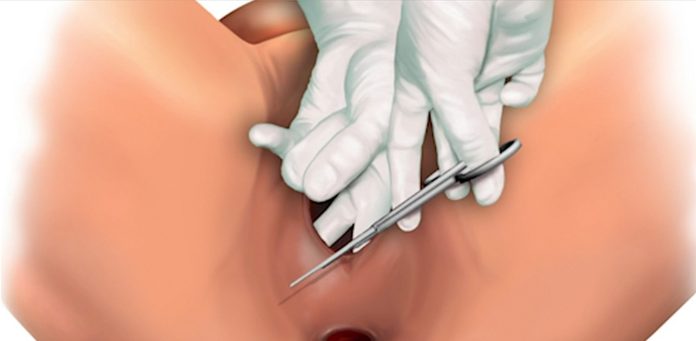It sounds like a crude joke: A doctor stitches up a woman extra tight following childbirth while throwing a wink at her husband.
Yet “the husband stitch” — as they call it when a doctor provides an “extra” stitch while repairing an episiotomy or vaginal tear for the purpose of increasing male pleasure during sexual intercourse — has long been whispered about.
Some women claim that the under-the-radar stitch left them in immense pain, and with a lack of trust in their medical provider.
Women who have had been subjected to “tighter” stitches after episiotomy or tear, and mostly without their cooperation, have reported that sex is excruciatingly painful afterwards.
Consequently, some of them have had to undergo another experience of surgical interventions to loosen some stretch of the stitches.
A victim of “the husband stitch” said she realized that something was amiss when she couldn’t sit on a flat chair six weeks after delivery and when the episiotomy ought to have healed.
She reported feeling a “pinching” and “tugging” that she knew wasn’t normal.
“My midwives and I confirmed that I was significantly closed, compared to before,” the victim, Amarah Thompson, explains to Yahoo News.
“Three stitches, my midwife guessed. There was a seam of sewn tissue that had never torn, closing me up almost 50%. When I confirmed this, it crushed me,” she said later.
Amarah says she couldn’t be intimate with her partner, knowing she would “tear” if she tried, and that she couldn’t even work out without pain.
She ultimately had a vaginal-tear revision, and was able to return to intimacy with only minor pain. Worse still, she says she now suffers from hospital anxiety. The ordeal, she explains, “ruined what I thought was a positive hospital experience.”
Amarah is not the only woman to speak out about being intentionally stitched too tightly, as many mothers have also spoken out about their experience. Yet thus far, there are no studies on how many people actually received this stitch — and in many ways, it has been cloaked in the idea of it being just a myth.
‘Husband stitch driven by misogyny and patriarchy’
Speaking on the issue, board-certified Ob-Gyn Dr. Jennifer Conti, says the husband stitch has no medical support.
“Nowhere in any medical textbooks is there teaching about a ‘husband stitch’ or tightening of the vagina post-birth for the purpose of hypothetically improving sexual pleasure for the birthing person’s partner,” she says.
Dawn Thompson, a former doula [a professional labor assistant] who is now a maternal health advocate, says she’s only seen and heard of the husband stitch being done by male obstetricians.
She calls the practice “100% driven by paternalism and misogyny,” as it prioritizes male pleasure over a woman’s comfort.
‘Episiotomy is outdated’
Doctors began performing episiotomies regularly in the 1920s, as they believed that it would be easier to repair, and cause less trauma and damage overall, than a natural vaginal tear.
That’s why, by 1979, 63% of all deliveries in the United States included an episiotomy. It wasn’t until further research was done that the tide shifted. It was found that episiotomies may cause more harm than good, and may lead to negative consequences such as incontinence, pain during sex and infections.
In 2006, the American College of Obstetricians and Gynecologists recommended against episiotomies, and by 2012, only 12% of vaginal births included one.
Sue the doctor!
Experts say the so-called husband stitch is not supposed to happen and that if the stitch was performed without informed consent from the patient, then legal action might be the next appropriate step.
“Failure to obtain informed consent during any medical procedure can have potential legal action for the person or people performing the procedure,” experts say.


